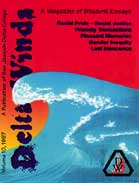The Great Skater
 Delta Winds: A Magazine of Student Essays
Delta Winds: A Magazine of Student Essays
A Publication of San Joaquin Delta College
1997
The Great Skater
Oksana Louie
Like any other sport, ice skating is obliged to creative people who bring something new to it. These people are known to everyone as the inventors of particular jumps, splits, spins. They are given credit for their work and, sometimes, the skating moves they invented carry their names. For instance, the Lutz jump was invented by Alois Lutz before World War II; the Walley jump was attributed to Bruce Mapes who performed with the Ice Follies in the 1930s. With Mabel Fairbanks that was never the case. The spins she invented never have been officially admitted to be exclusively her creation.
For me, it was a profound experience to be coached by her, as I was learning not only the art of skating, but also many things that one can learn from a wise person. I treasure her advice very much.
Mabel Fairbanks was a brilliant and a hard working skater. The only problem she experienced over and over was the unwillingness of the skating world to admit that she was deeply talented. It was the second quarter of the 20th century, and she was not allowed to perform the major skating movements--the elements she found the most fun to perform. She was black, she was too good, and the other girls in the show wouldn't look as skillful having Mabel performing next to them. In fact, Sonja Heini once refused to allow Mabel to join Sonja's popular skating troupe because Mabel was too gifted.
Mabel was restricted in her skating to the simple elements. But, Mabel wouldn't be Mabel if she didn't extricate herself from the restrictions. How? The solution was ingenious: "If they don't let me skate the conventional way, I'll invent something of my own. This way, nobody and nothing can prevent me from skating to my full abilities."
Necessity turned out to be the mother of invention. In a short period of time, Mabel, the first black superstar skater in the history of the United States, came up with the new variations of basic spin. They were so gorgeous! She was the star of the shows at British West Indies with the famous Ice Follies, and in Mexico with the Ice Capades. The only sad thing is that the spins she invented have never been called anything more than just spin's variations. If it were for me, I'd call them Fairbanks spins. We all know them very well, the spin in which you extend your leg back and up above your head, or another graceful spin in which you hold your leg straight up.
We have seen them so many times that we no longer admire them the way they deserve to be admired. But, just imagine the excitement of the audience when the spins were first performed by Mabel! Wouldn't you love to go back in time and see it all for yourself? Unfortunately, Mabel never received the recognition for her innovations because in order to be recognized you have to perform the spins at the major skating competitions. But she was never allowed to participate in them.
While the "official" skating world denied Mabel's contributions, world-renowned skaters sought her out as a coach. Her students include the United States and World Champions Tai Babilonia and Randy Gardner, Kristi Yamaguchi, Rudy Galindo, and Tiffany Chin. She did, however, finally receive recognition after many years of work as a skater and as a coach. She was accepted into the Hall of Fame on the 25th of February 1997. She was the only one to receive three standing ovations and an engraved silver bowl at the United States Figure Skating Championship. It was the day of her triumph. At long last, she received official recognition of her merits.
Mabel is now over 80 years old; nobody knows her exact age, even Mabel herself. She is one of those people who will always have young souls despite their age. She likes to say that she has lived an amazing life, and that she wouldn't change a minute of it. She was very good friends with Cary Grant, Houdini, Dean Martin, Frank Sinatra, and Zsa Zsa Gabor. She has had it all---fame and fortune, applause and the loss of loved ones. But all of these could never change her passionate and understanding heart, her eyes radiating love.
"You have to skate seven days a week in order to be any good," says Mabel to me. "And love skating the way you love it, " I add in my thoughts. These are the vital prerequisites for a great skater--a skater capable of growing, a skater who is willing to give and share her talents and experiences with others. The way Mabel Fairbanks is and always will be.






